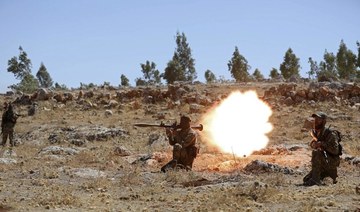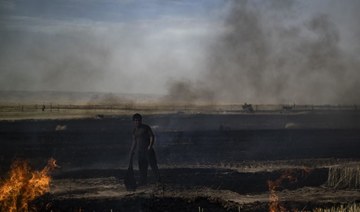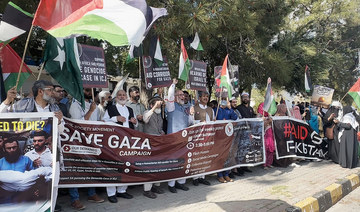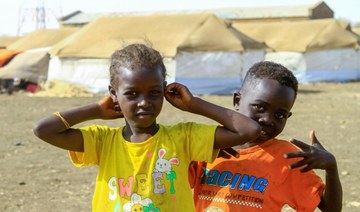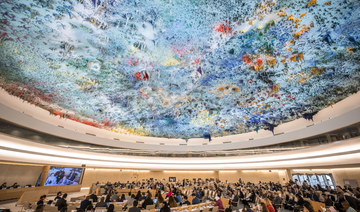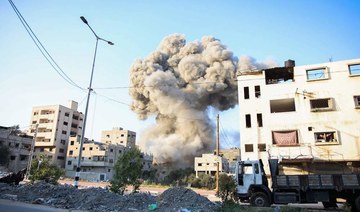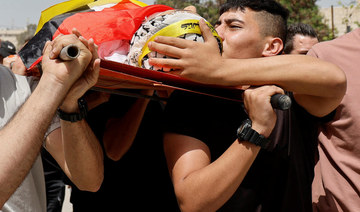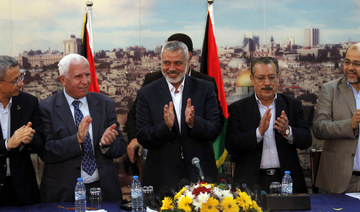ALEPPO: In the old khan, a stone courtyard off Aleppo’s medieval souk, most of the 41 cloth shops are deserted. Many of the owners moved elsewhere or went abroad to escape fighting in the historic Syrian city, a major economic center before the war.
“Some started new work outside Syria and won’t return. Some who stayed opened new shops in other parts of the country,” said Mohammed Abu Zeid, one of two cloth merchants still operating.
Syria’s economy has been upturned by eight years of war that partitioned the country between rival forces and displaced millions of people. Hundreds of thousands of workers were conscripted into the army or joined rebel groups and Western powers have imposed sweeping sanctions.
Any recovery will largely depend on whether people return home, including local business owners. The empty stores in Khan Khair Bek show that most have stayed away and it may be some time before business resumes.
Although parts of western Aleppo, which was held by the government through the war, still have busy shopping areas, the city’s factories and wholesale trading businesses have been devastated by war damage and the departure of traders.
Textiles were a mainstay of Aleppo business until the start of the war in 2011. The khan in the Souk Al-Zarb section of the battered Old City was a textile hub. Merchants kept their wares and conducted wholesale business in the shops. When Reuters first visited in early 2017, weeks after the fighting ended, the khan was closed and the domed entranceway was waist-deep in debris including bullet casings and the tail fin of a mortar bomb.
Thirteen shop owners moved abroad, mostly to Egypt or Turkey. Of those still in Syria, six moved to Damascus or other cities, and started new businesses. Another seven who remained in Aleppo have also stopped dealing in cloth, Abu Zeid said.
Ten others are working in the cloth trade from market stalls or rented shops in other parts of Aleppo. Just two, Abu Zeid and Zakariya Azizeh, reopened in the khan earlier this year. They did not know the whereabouts of several other neighbors.
About half Syria’s pre-war population of 22 million were uprooted during the conflict, with more than 5 million seeking refuge abroad.
Some refugees have started returning, but most are unwilling to go back yet, citing a fear of reprisals, the danger of renewed conflict, economic hardship and problems with paperwork.
Economic troubles
Azizeh said he was trying to persuade his former neighbors to come back.
“We cannot export and we have banking problems from sanctions. The system depends on credit, but I haven’t any money,” he said.
President Bashar Assad said Syria now faces an economic war waged through Western sanctions. They make any movement of money in or out of Syria very difficult, paralysing trade even with close allies such as Russia and Iran and making any return to Syria less attractive for business owners.
Abu Zeid believes most of the those who left the khan will eventually return. Many still own their premises.
“This is the best khan for import-export. The others, they tell us ‘one month, two months, we will come back’,” he said.
His cousin, Ahmed Abu Zeid, 63, a cousin of Mohammed Abu Zeid, has continued doing some business from home as it would cost several thousand dollars to replace stock and repair his war-damaged shop, near a mulberry tree.
“We all worked here from when we were children. I used to climb this tree and so did my son,” he said. He hopes his grandson Ahmed, 8, will one day work there too.
Damage
The two main centers of Aleppan business — the Old City souk and the industrial zones on the city’s outskirts — were on the front lines and suffered from heavy shellfire and looting.
Shops and warehouses were stripped of their inventories, factories and workshops of their equipment and machinery. Many are pocked with bullet or shell holes and filled with rubble.
Aleppo’s power plant was destroyed and electricity supplies from other parts of government-held Syria are limited. Water provision is patchy. One of the main industrial zones, Belleramoun, is near a front line and has been repeatedly shelled by rebels.
In the souk outside the khan, a group had gathered to chat on plastic chairs. They recited lists of friends and neighbors who had left.
“Some of them have come back to see what the situation is like. When they see it, they go away again,” said Mohammed Fadel, dressed in a suit and waving a lit cigarette as he spoke.
He had two shops in the souk, both now closed, and a textile workshop with four machines and 400 workers running round the clock and exporting across the Middle East, Fadel said.
He now plans to leave Syria and go to live in the Netherlands, where his son is.
“What can I do? I sit here all day doing nothing,” he said.
Aleppo’s scattered business owners have yet to return home
Aleppo’s scattered business owners have yet to return home
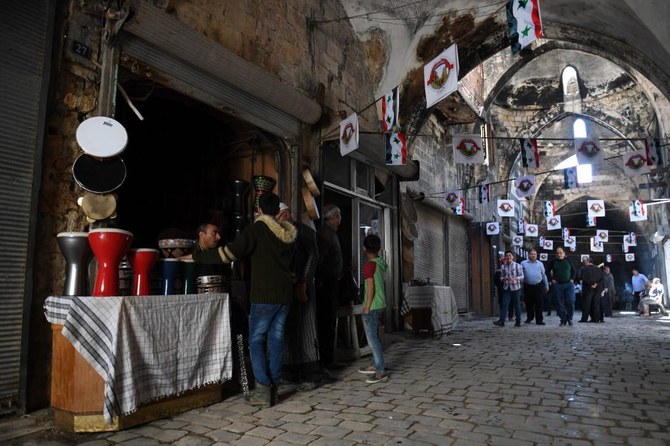
- The recovery of businesses will depend on whether people will return to Syria or not
- Most of the shop owners travelled to Turkey and Egypt
Ships from Turkiye planning to deliver aid to Gaza were denied right to sail
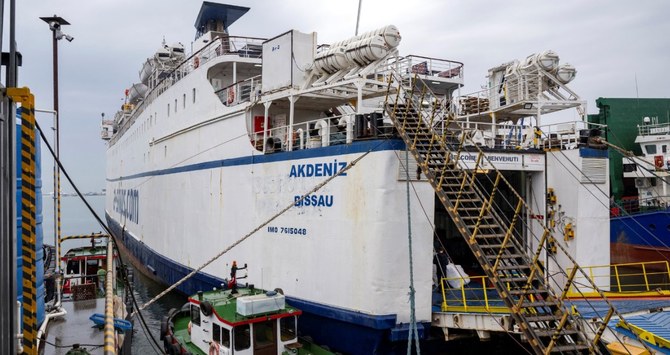
- The Freedom Flotilla Coalition described the cancelation of the vessels’ registry as a “blatantly political move,” adding: “Without a flag, we cannot sail”
- The organizers blamed Israel for applying pressure to prevent the flotilla
ISTANBUL: A three-ship flotilla planning to reach Gaza with humanitarian aid from Turkiye was prevented from sailing by Guinea-Bissau authorities, which took down their country’s flags from two ships, organizers said.
Just before the flotilla was set to sail from Turkiye to Gaza on Friday with 5,000 tons of aid, a surprise inspection by the Guinea-Bissau International Ships Registry resulted in the removal of the flags from two of the Freedom Flotilla ships.
A press release by the Freedom Flotilla Coalition described the cancelation of the vessels’ registry as a “blatantly political move,” adding: “Without a flag, we cannot sail.”
The organizers blamed Israel for applying pressure to prevent the flotilla. “It is obvious, and I think it is publicly known, that there has been close contact between Israel and the president of Guinea-Bissau,” organizer and steering committee member Torstein Dahle told The Associated Press, without elaborating.
He said that hundreds of Turkish and international participants were disappointed by the cancelation. “It is very hard for us, because it takes time to procure a flag. It’s a procedure that can’t be done in a few days. ... But we’re not giving up.”
The Freedom Flotilla Coalition includes Turkish and international organizations, among them the IHH and the Mavi Marmara Association from Turkiye, which also organized an ill-fated 2010 flotilla.
On May 31, 2010, Israeli commandos stormed the Mavi Marmara in international waters, leading to an altercation that left nine people dead and dozens of activists wounded. On the Israeli side, seven soldiers were wounded by activists who attacked them with clubs, knives and pipes.
Lebanon moves toward accepting ICC jurisdiction for war crimes on its soil
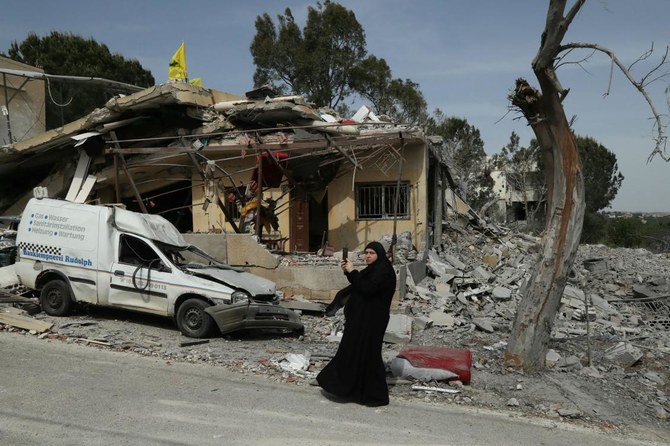
- Neither Lebanon nor Israel are members of the ICC
- Filing a declaration to the court would grant it jurisdiction to investigate and prosecute relevant crimes in a particular period
BEIRUT: Lebanon has moved toward accepting the International Criminal Court’s jurisdiction to prosecute violations on Lebanese territory since October, in what Human Rights Watch said on Saturday was a “landmark step” toward justice for war crimes.
Lebanon has accused Israel of repeatedly violating its sovereignty and committing breaches of international law over the last six months, during which the Israeli military and Lebanese armed group Hezbollah have traded fire across Lebanon’s southern border in parallel with the Gaza War.
That cross-border shelling has killed at least 70 civilians, including children, rescue workers and journalists, among them Reuters visuals reporter Issam Abdallah, who was killed by an Israeli tank on Oct. 13, a Reuters investigation found.
Lebanon’s caretaker cabinet voted on Friday to instruct the foreign affairs ministry to file a declaration with the ICC accepting the court’s jurisdiction to investigate and prosecute crimes committed on Lebanese territory since Oct. 7.
The decree also instructed the foreign ministry to include in its complaints about Israel to the United Nations a report prepared by the Netherlands Organization for Applied Scientific Research (TNO), an independent research institute.
That report looked specifically into Abdallah’s killing, and was produced by examining shrapnel, flak jackets, a camera, tripod and a large piece of metal that were gathered by Reuters from the scene, as well as video and audio material.
Neither Lebanon nor Israel are members of the ICC, which is based in The Hague. But filing a declaration to the court would grant it jurisdiction to investigate and prosecute relevant crimes in a particular period.
Ukraine has twice filed such declarations, which allowed for the court to investigate alleged Russian war crimes.
“The Lebanese government has taken a landmark step toward securing justice for war crimes in the country,” said Lama Fakih, Middle East and North Africa director at Human Rights Watch, urging the foreign minister to “swiftly” formalize the move by filing a declaration to the ICC.
“This is an important reminder to those who flout their obligations under the laws of war that they may find themselves in the dock,” Fakih said.
British troops may be tasked with delivering Gaza aid, BBC report says
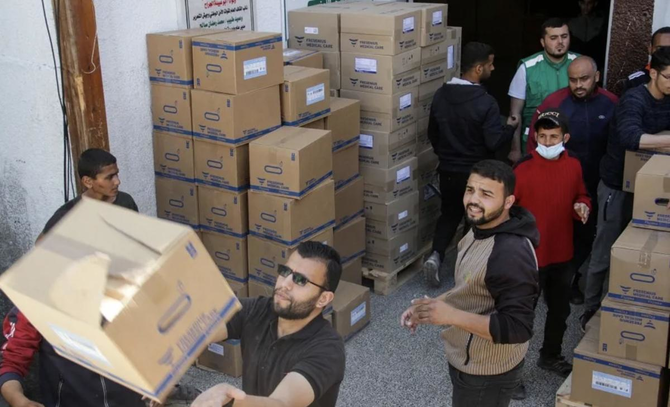
- Britain is already providing logistical support for construction of US pier, including a Royal Navy ship that will house hundreds of American soldiers
LONDON: British troops may be tasked with delivering aid to Gaza from an offshore pier now under construction by the US military, the BBC reported Saturday. UK government officials declined to comment on the report.
According to the BBC, the British government is considering deploying troops to drive the trucks that will carry aid from the pier along a floating causeway to the shore. No decision has been made and the proposal hasn’t yet reached Prime Minister Rishi Sunak, the BBC reported, citing unidentified government sources.
The report comes after a senior US military official said on Thursday that there would be no American “boots on the ground” and another nation would provide the personnel to drive the delivery trucks to the shore. The official, who spoke to reporters on condition of anonymity to discuss details not yet made public, declined to identify the third party.
Britain is already providing logistical support for construction of the pier, including a Royal Navy ship that will house hundreds of US soldiers and sailors working on the project.
In addition, British military planners have been embedded at US Central Command in Florida and in Cyprus, where aid will be screened before shipment to Gaza, for several weeks, the UK Ministry of Defense said on Friday.
The UK Hydrographic Office has also shared analysis of the Gaza shoreline with the US to aid in construction of the pier.
“It is critical we establish more routes for vital humanitarian aid to reach the people of Gaza, and the UK continues to take a leading role in the delivery of support in coordination with the US and our international allies and partners,” Defense Secretary Grant Shapps said in a statement.
Development of the port and pier in Gaza comes as Israel faces widespread international criticism over the slow trickle of aid into the Palestinian territory, where the United Nations says at least a quarter of the population sits on the brink of starvation.
The Israel-Hamas began with a Hamas-led attack into southern Israel on Oct. 7, in which militants killed around 1,200 people, mostly civilians, and took some 250 people as hostages. Israel says the militants are still holding around 100 hostages and the remains of more than 30 others. Since then, more than 34,000 Palestinians have been killed in Israel’s air and ground offensive, according to the Health Ministry in Hamas-run Gaza, around two-thirds of them children and women.
Israeli soldiers kill two Palestinian gunmen in West Bank, military says
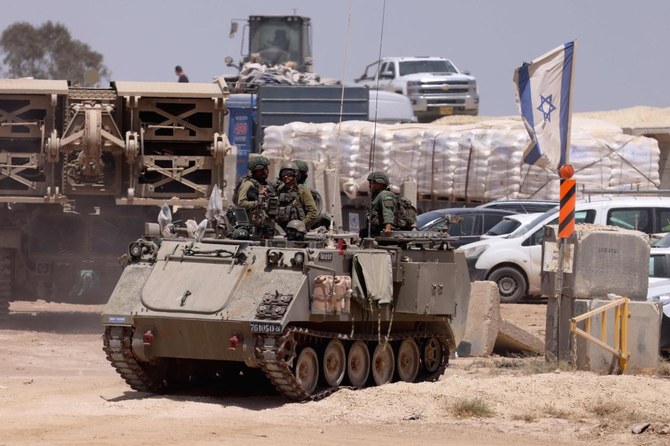
- Violence has been on the rise as Israel presses its attacks and bombardment in Gaza
RAMALLAH, West Bank: Israeli soldiers killed two Palestinian gunmen who opened fire at them from a vehicle in the occupied West Bank, the military said on Saturday.
The military released a photo of two automatic rifles that it said were used by several gunmen to shoot at the soldiers, at an outpost near the flashpoint Palestinian city of Jenin.
The official Palestinian news agency Wafa said security officials confirmed two deaths and the health ministry said two other men were wounded.
There was no other immediate comment from Palestinian officials in the West Bank, where violence has been on the rise as Israel presses its war against Palestinian militant group Hamas in Gaza.
Israel launched its offensive in Gaza after Hamas led an attack on southern Israel on Oct. 7 in which 1,200 people were killed and 253 taken hostage. More than 34,000 Palestinians have since been killed and most of the population displaced.
Violence in the West Bank, which had already been on the rise before the war, has since flared with stepped up Israeli raids and Palestinian street attacks.
The West Bank and Gaza, territories Israel captured in the 1967 war, are among the territories which the Palestinians seek for a state. US-brokered peace talks collapsed a decade ago.
Hamas says it received Israel’s response to its ceasefire proposal
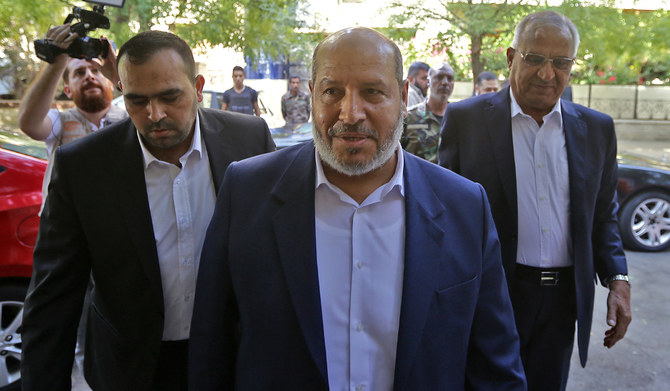
- White House national security adviser Jake Sullivan said on Friday he saw fresh momentum in talks to end the war and return the remaining hostages
- Israel has killed more than 34,000 Palestinians in Gaza, mostly women and children, according to the health ministry in the Hamas-run territory
CAIRO: Hamas said it had received on Saturday Israel’s official response to its latest ceasefire proposal and will study it before submitting its reply, the group’s deputy Gaza chief said in a statement.
“Hamas has received today the official response of the Zionist occupation to the proposal presented to the Egyptian and the Qatari mediators on April 13,” Khalil Al-Hayya, who is currently based in Qatar, said in a statement published by the group.
After more than six months of war with Israel in Gaza, the negotiations remain deadlocked, with Hamas sticking to its demands that any agreement must end the war.
An Egyptian delegation visited Israel for discussion with Israeli officials on Friday, looking for a way to restart talks to end the conflict and return remaining hostages taken when Hamas fighters stormed into Israeli towns on Oct. 7, an official briefed on the meetings said.
The official, who spoke on condition of anonymity, said Israel had no new proposals to make, although it was willing to consider a limited truce in which 33 hostages would be released by Hamas, instead of the 40 previously under discussion.
On Thursday, the United States and 17 other countries appealed to Hamas to release all of its hostages as a pathway to end the crisis.
Hamas has vowed not to relent to international pressure but in a statement it issued on Friday it said it was “open to any ideas or proposals that take into account the needs and rights of our people.”
However, it stuck to its key demands that Israel has rejected, and criticized the joint statement issued by the USand others for not calling for a permanent ceasefire and the withdrawal of Israeli forces from Gaza.
White House national security adviser Jake Sullivan said on Friday he saw fresh momentum in talks to end the war and return the remaining hostages.
Citing two Israeli officials, Axios reported that Israel told the Egyptian mediators on Friday that it was ready to give hostage negotiations “one last chance” to reach a deal with Hamas before moving forward with an invasion of Rafah, the last refuge for around a million Palestinians who fled Israeli forces further north in Gaza earlier in the war.
Meanwhile, in Rafah, Palestinian health officials said an Israeli air strike on a house killed at least five people and wounded others.
Hamas fighters stormed into Israeli towns on Oct. 7, killing 1,200 people and capturing 253 hostages. Israel has sworn to annihilate Hamas in an onslaught that has killed more than 34,000 Palestinians.



